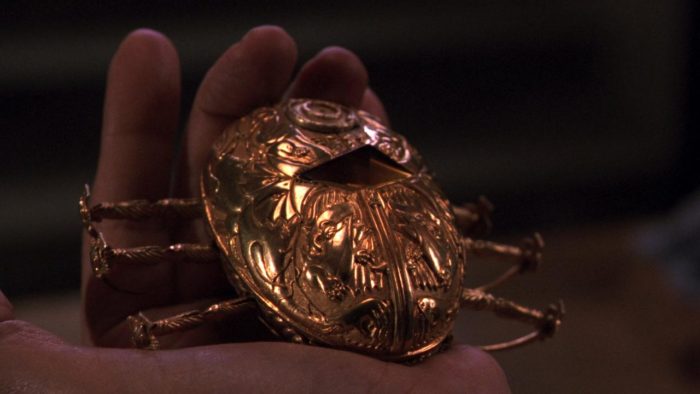VOD film review: Cronos (1993)
Review Overview
Federico Luppi's moving performance
8The creepy 'Cronos device'
8Anton Bitel | On 04, Feb 2018
Director: Guillermo del Toro
Cast: Federico Luppi, Ron Perlman, Claudio Brook, Tamara Shanath, Margarita Isabel, Daniel Giménez Cacho, Mario Iván Martínez
Certificate: 18
Watch Cronos online in the UK: Currently unavailable on VOD
With The Shape of Water swimming into UK cinemas this February, we begin a Guillermo Del Toro retrospective, looking back at the director’s career, from the underrated gems available to stream to the lesser-known early works that are not.
The events of Cronos span three time periods (the title means ‘times’ in Spanish). The prologue, narrated by Jorge Martínez de Hoyos, briefly opens in 1536 with an alchemist in Veracruz forging a mechanism (the ‘Cronos device’) said to grant its owner immortality; it then skips to 1937, when an old man is killed by a collapsing building, and his mansion is found to conceal hermetic writings and a human corpse being bled. Most of the action then unfolds in late 1996 and early 1997, as aged antiques dealer Jesus Gris (Federico Luppi) discovers a strange device hidden in the statuette of an archangel, and over the Christmas and New Year, finds himself reenacting a horror-inflected version of his Biblical namesake’s story.
What’s curious about these three dates is that none of them corresponds to the year in which Cronos was actually released: 1993. For the film both looks back to a distant past, and forward to the future. Nowadays, the arrival of another Guillermo del Toro film is something to anticipate and celebrate, but back in 1993, Cronos was his unheralded feature debut, when nobody had heard of the Mexican writer/director, apart from those familiar with the model-making and special effects work of his company Necropia, or with the Guadalajara International Film Festival that he helped to found. Yet already it was clear this was a filmmaker with a future.
There are two things that immediately strike any viewer looking back at Cronos today. The first is that it is possible to discern in the film many of the director’s subsequent motifs and preoccupations emerging in embryonic form, as though the film were a map for del Toro’s future filmmaking. For here we can already see an obsession with cogs and clockworks, with heroic monsters and monstrous humans, with the child’s eye view of adult affairs, as well as the first collaboration with del Toro regular Ron Perlman, and even, in Jesus’ innocent (and near-silent) granddaughter Aurora (newcomer Tamara Shanath), the template for Sally Hawkins’ mute heroine in The Shape of Water. The second is that, before del Toro’s own filmmaking style and character had yet had time fully to gel into something recognisable, he owed a considerable debt to David Cronenberg, whose body horror, love of insects and reformulation of gothic myths are all obvious influences on Cronos.
Once the Cronos device, a golden clockwork scarab that combines mechanical and organic materials, has got its hooks in Jesus, he finds himself changing, so that now, all at once, he is reinvigorated with youthful energy, yet craves blood and shuns the light. In other words, he is an esoteric variant on the vampire – and moribund Dieter de la Guardia (Claudio Brook), who longs to have the device to secure his own future, already has in his possession the alchemist’s instructions for it, so that, unlike Jesus, he fully understands and accepts the terrible price of eternal life. Jesus may already be transforming, may indeed be born again, and will even undergo a resurrection – but unlike the devilish Dieter, Jesus may yet prove capable of choosing to resist temptation and to sacrifice himself for the good of others.
“Not everything is garbage,” Dieter insists to his greedy, thuggish nephew Angel (Perlman) who is puzzled as to why his uncle is collecting statues of archangels. Del Toro, too, knows that he is working in a genre typically dismissed as trash, but nonetheless, like an alchemist, he transmutes it into pure cinematic gold. For Cronos is ultimately a moral fable about faith and family and the need, if one is to guarantee the life of future generations, to accept death ‘in its own time’ – which are (in Latin) the last words that the alchemist is heard to utter back in 1937. Most important, though, are Jesus’ words to Aurora: “I don’t even know what’s wrong with me – but I think it’s best that we’re together.” For Jesus’ touching loyalty to his granddaughter contrasts with all the selfish behaviour of Dieter and Angel towards both each other and everyone else.
Cronos is not currently available to watch online in the UK, but is available on DVD. Bookmark this page to find out when and where the film is released on VOD.




















